
Quantitative Economics
Scope & Guideline
Transforming economic research with impactful quantitative findings.
Introduction
Aims and Scopes
- Empirical Economic Analysis:
The journal emphasizes empirical studies that utilize quantitative data to explore economic theories and models, enhancing the understanding of economic dynamics. - Labor Market Dynamics:
Research related to labor market trends, employment patterns, and the impact of economic policies on labor is a core focus area, particularly in emerging economies. - Trade and Development Economics:
The journal covers topics on trade liberalization, its effects on economies, and the interrelationship between trade and economic development. - Monetary Policy and Financial Economics:
Papers exploring the implications of monetary policy on various economic indicators, including inflation and growth, are frequently published. - Environmental and Energy Economics:
Research on the intersection of economic activities, energy consumption, and environmental impacts is increasingly significant, addressing global challenges. - Innovative Methodologies in Economics:
The use of advanced quantitative methods, including machine learning and econometric modeling, is a hallmark of the journal, fostering innovative approaches to economic research.
Trending and Emerging
- Impact of COVID-19 on Labor Markets:
There is a growing emphasis on understanding the effects of the COVID-19 pandemic on labor markets, with studies examining employment dynamics and recovery strategies. - Use of Machine Learning in Economic Forecasting:
The application of machine learning techniques for economic modeling and forecasting is increasingly prominent, showcasing the journal's commitment to integrating advanced methodologies. - Sustainability and Economic Growth:
Research focusing on sustainable economic practices, including the relationship between energy consumption and environmental impacts, is gaining importance as global awareness of climate issues rises. - Inequality and Economic Development:
Papers exploring the nexus between economic growth and inequality, particularly in developing contexts, are becoming more frequent, reflecting growing concerns about inclusive growth. - Digital Economy and Technological Impact:
The implications of digital transformation on economic structures, labor markets, and productivity are emerging as significant themes, indicating a shift towards understanding the digital economy's role.
Declining or Waning
- Traditional Economic Theories:
There has been a noticeable decrease in papers strictly adhering to classical economic theories without empirical backing, as the journal shifts towards more data-driven approaches. - Basic Statistical Methods:
The reliance on elementary statistical methods appears to be waning, with a preference for more sophisticated analytical techniques and models. - Static Economic Models:
The journal seems to be moving away from static models that do not account for dynamic economic processes, favoring research that captures changing economic conditions. - Geographic-specific Studies:
Research focusing solely on narrowly defined geographic areas, particularly outside of emerging economies, seems to be less prevalent, possibly due to a broader interest in global economic interconnections.
Similar Journals

Quantitative Finance and Economics
Exploring Innovative Quantitative Techniques for Economic ImpactQuantitative Finance and Economics, published by the American Institute of Mathematical Sciences (AIMS), is a pioneering open-access journal committed to advancing the fields of finance and economics. Established to disseminate high-quality research, this journal has been an open-access platform since 2017, promoting wider accessibility to vital academic findings. It serves as a crucial resource for researchers and professionals alike, offering valuable insights through rigorous studies in quantitative methods that influence financial and economic decision-making. Although current Scopus rankings indicate emerging challenges, with a rank in the lower percentiles across various categories, Quantitative Finance and Economics strives to gain recognition by bridging theoretical frameworks with practical applications. The journal invites contributions that explore innovative quantitative techniques and their implications in contemporary economic scenarios, thus underscoring its role in shaping discourse and research in this critical sector.
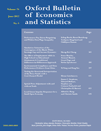
OXFORD BULLETIN OF ECONOMICS AND STATISTICS
Charting new territories in economic research.The Oxford Bulletin of Economics and Statistics, published by Wiley, stands as a leading journal in the realms of Economics, Econometrics, and Statistics. Since its inception in 1973 and converging through to 2024, the journal has consistently positioned itself in the top quartile (Q1) across multiple categories, including Economics and Econometrics, Social Sciences, and Statistics and Probability, highlighting its influential status in the academic community. With a commendable ranking within Scopus, notably ranked #53 in Social Sciences and #28 in Statistics and Probability, it serves as a critical platform for disseminating rigorous research and innovative methodologies. Researchers, professionals, and students are encouraged to contribute and engage with the high-quality content that defines this esteemed journal, which does not currently offer Open Access but remains a pivotal resource for those seeking to deepen their understanding of economic and statistical paradigms in the pressing global landscape.
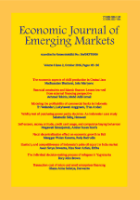
Economic Journal of Emerging Markets
Unlocking Potential in Dynamic MarketsEconomic Journal of Emerging Markets, published by UNIV ISLAM INDONESIA, serves as a pivotal platform for scholars and practitioners focused on the dynamic landscape of emerging economies. With an ISSN of 2086-3128 and an E-ISSN of 2502-180X, this Open Access journal has been dedicated to disseminating high-quality research since 2009, making it accessible to a global audience interested in economic development, policy analysis, and market dynamics. Situated in Yogyakarta, Indonesia, the journal emphasizes innovative research and empirical studies that contribute to the understanding of economic issues faced by emerging markets. Although specific H-index and quartile rankings are pending, the journal aims to establish a strong academic presence and foster interdisciplinary collaborations among researchers, professionals, and students alike, addressing critical economic challenges and opportunities.
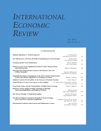
INTERNATIONAL ECONOMIC REVIEW
Elevating the standard of economic scholarship globally.INTERNATIONAL ECONOMIC REVIEW is a prestigious journal dedicated to advancing knowledge in the fields of economics and econometrics. Published by Wiley in the United Kingdom, this journal boasts an impressive Q1 ranking in the 2023 category of Economics and Econometrics, reflecting its significant impact in the academic community. With a continued publication since its inception in 1979, it offers a platform for rigorous scholarly articles that address contemporary issues, theoretical developments, and empirical findings in economics. Although it does not currently offer open access options, the journal maintains broad accessibility through institutional subscriptions. Researchers, professionals, and students are encouraged to contribute to and engage with this leading publication to foster knowledge exchange and stimulate scholarly dialogue in economic research. With its commitment to high-quality scholarship, the INTERNATIONAL ECONOMIC REVIEW remains a vital resource for developing insights that inform both policy and practice.
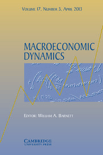
MACROECONOMIC DYNAMICS
Pioneering Research for Informed Economic PoliciesMACROECONOMIC DYNAMICS, a distinguished academic journal published by Cambridge University Press, serves as a pivotal platform for innovative research in the fields of economics and econometrics. With its ISSN 1365-1005 and E-ISSN 1469-8056, the journal has been at the forefront of scholarly communication since its inception in 1997, offering an extensive range of articles that explore dynamic economic models, policy impacts, and theoretical advancements through the latest empirical analyses. Currently holding a Q2 ranking within the 2023 Economics and Econometrics category, and positioned at rank #409 out of 716 within Scopus, it is an essential resource for researchers, professionals, and students alike, looking to stay updated on critical developments in macroeconomic theory and practice. Although it follows a traditional subscription model rather than Open Access, the journal continually strives to disseminate high-quality, peer-reviewed content that informs and inspires the global economics community. The importance of MACROECONOMIC DYNAMICS lies in its commitment to fostering a deeper understanding of economic phenomena, making it a must-read for anyone engaged in the complexities of the economic landscape.
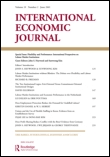
INTERNATIONAL ECONOMIC JOURNAL
Exploring Global Trends Through Rigorous Research.Welcome to the INTERNATIONAL ECONOMIC JOURNAL, a premier publication dedicated to advancing the fields of economics, econometrics, and finance. Established in 1987 and published by Taylor & Francis Ltd, this journal has consistently contributed to scholarly discourse and empirical research. With an impressive 2023 Scopus Ranking placing it at #112 out of 288 in its category, the journal holds a commendable Q2 quartile rating, reflecting its significant impact among economists and financial analysts alike. The INTERNATIONAL ECONOMIC JOURNAL serves as a vital platform for researchers and professionals to disseminate innovative findings, theoretical advancements, and practical applications in economic theory and policy. While not open access, the journal continues to attract a wide readership, offering insight into global economic trends and challenges. This makes it an essential resource for students, academics, and industry practitioners aiming to deepen their understanding of contemporary economic issues.
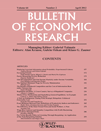
BULLETIN OF ECONOMIC RESEARCH
Connecting Scholars to Innovative Economic IdeasBULLETIN OF ECONOMIC RESEARCH is a premier academic journal published by WILEY, dedicated to the dissemination of high-quality research in the field of economics and econometrics. Established in 1948, the journal has a rich history of contributing to the scholarly dialogue surrounding economic theory and practice, making it an essential resource for researchers, professionals, and students alike. With an impressive impact factor and ranked in the Q3 category for 2023, the journal publishes original research articles, reviews, and theoretical discussions that reflect current trends and developments in the field. Despite not being an open-access journal, it offers numerous access options through institutional subscriptions, ensuring wide dissemination of its impactful content. Aiming to foster a deeper understanding of economic issues, the BULLETIN OF ECONOMIC RESEARCH serves as a vital platform for ongoing scholarly debate and innovation in economic thought.

ECONOMIST-NETHERLANDS
Pioneering Research for the Evolving Economic LandscapeThe Economist-Netherlands, published by Springer, is a prestigious journal that has been a cornerstone in the field of economics since its inception in 1852. With a strong focus on disseminating high-quality research and insights, this journal serves as an essential resource for economists, researchers, and practitioners interested in the dynamic landscape of economic theory and applications. Currently ranked in the Q3 category in Economics and Econometrics, this journal demonstrates a commitment to scholarly rigor, as reflected in its Scopus ranking within the 55th percentile. The journal features an extensive scope that encompasses key topics relevant to both historical and contemporary economic challenges, fostering a vibrant academic discourse. While access is not open, the journal remains a vital publication for anyone seeking to advance their knowledge in the economic sector. With an enduring legacy, the Economist-Netherlands continues to contribute significantly to the evolution of economic scholarship.
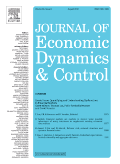
JOURNAL OF ECONOMIC DYNAMICS & CONTROL
Unveiling Insights in Applied Mathematics and EconometricsJOURNAL OF ECONOMIC DYNAMICS & CONTROL, published by Elsevier, is a distinguished scholarly journal that has established itself as a leading outlet in the fields of applied mathematics, control and optimization, and economics and econometrics since its inception in 1979. With its notable Q1 categorization in 2023 across these disciplines, this journal provides a platform for innovative research that propels theory and practice in dynamic systems and control processes. Researchers, professionals, and students can engage with cutting-edge studies that explore complex economic models and their real-world applications. Although the journal does not offer open access, it remains a vital resource for those aiming to stay informed of the latest advancements in economic dynamics and control methodologies. The journal’s commitment to high-quality research and its impressive standing—ranked in the top percentiles within Scopus categories—underscore its importance and influence within the academic community.
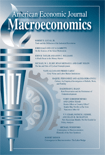
American Economic Journal-Macroeconomics
Shaping Economic Thought Through Rigorous ResearchAmerican Economic Journal-Macroeconomics, published by the American Economic Association, stands at the forefront of economic research, addressing pivotal macroeconomic issues that shape global economies. With an impressive Scopus rank of #8 out of 288 in its field and a notable 97th percentile ranking, this journal is widely regarded as a top-tier publication, specifically categorized in the Q1 category for Economics, Econometrics, and Finance as of 2023. Operating under ISSN 1945-7707 and E-ISSN 1945-7715, it aims to disseminate high-quality research from 2009 through 2024 and beyond, providing crucial insights into macroeconomic theory and policy. Although the journal currently does not operate under an open access model, it remains a vital resource for researchers, economists, and students seeking to deepen their understanding of macroeconomic dynamics and their implications for economic policy worldwide. The journal's impactful contributions make it an essential read for those striving to influence economic thought and practice.